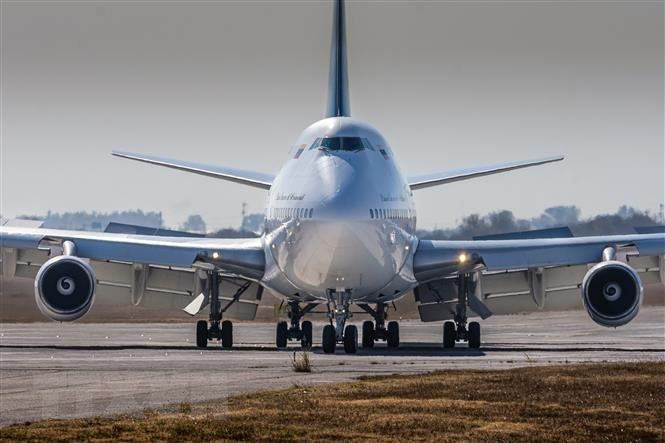Although the global aviation industry was once considered to be witnessing a bright recovery prospect after a long period of stagnation due to the COVID-19 epidemic, the industry has continued to struggle with a series of difficulties, mainly due to the shortage of human resources.

Illustrative image (Photo: AFP/VNA)
The problem of shortage of personnel and the unresolved conflicts between workers and business owners are major barriers to the growth of this industry.
In the past few days, the operation of many airports in the UK and Germany was seriously disrupted by a wave of workers' strikes demanding an increase in wages. In Germany, employees at the four major airports of Düsseldorf, Köln/Bonn, Stuttgart, and Karlsruhe/Baden-Baden went on strike to put pressure on employers during salary hike negotiations. The force participating in the strike includes security personnel, who are responsible for controlling passengers, and goods and public services workers, leaving airports unable to operate normally.
According to statistics, 681 flights were cancelled in just one day, with about 89,000 passengers affected by the events. In the UK, security staff at London's Heathrow Airport also announced that they would go on strike for ten days, from March 31 to April 9.
The key to the divide between workers and employers is that wages have not kept pace with inflation. Workers say that, with current wages, they cannot live with persistently high inflation and energy bills many times higher than before due to the impact of the conflict situation in Ukraine. Discussions and negotiations between trade unions and governments have yet to find a solution. The wave of strikes has not only caused losses to airlines but also made passengers miserable because flight cancellations took place "as usual".
The workload is overloaded; the working environment is so chaotic during peak times that make many airline employees feel exhausted and want to quit. Verdi, one of the largest services sector trade unions in Germany, calls for higher wages for employees working nights, weekends, holidays, and overtime.
As with European countries, the US aviation industry is also suffering a headache due to personnel pressure. US officials are calling on the US Federal Aviation Administration (FAA) to increase air traffic control staff to meet increased passenger demand. The country's Ministry of Transport announced that it is mobilising 117 million USD to recruit an additional 1,800 air traffic controllers by 2024. Airlines have also highlighted the dangers of a shortage of this force.
According to experts, the risk factors and uncertainties of the macro economy also affect the aviation industry. Airlines are faced with fluctuations in oil prices and an increase in the cost of fuel and spare parts, while high costs can affect people's travel activities. Recently, airports in many Canadian provinces and cities have begun to increase service fees. The reason is that many airports in this country are in debt due to damage during the COVID-19 pandemic and must try to make up some of the losses by increasing service fees for airline passengers.
In addition, the aviation industry is under pressure to fulfil its commitments to reducing greenhouse gas emissions and noise pollution. In the Netherlands, national carrier KLM and other airlines using Amsterdam's Schiphol Airport are suing the government over a plan to limit the number of flights per year. Specifically, the Dutch government decided to reduce the number of flights at Schiphol Airport to 440,000 flights/year, from 500,000 flights/year as at present, in order to reduce noise pollution and contribute to meeting climate goals. Airlines protested the decision, saying it would affect their business and the Dutch economy in general.
The global aviation industry was once predicted to prosper significantly by the end of 2023, with air travel demand about 3% higher than in 2019. However, the turbulence surrounding this industry will certainly make the post-COVID-19 recovery and growth process more precarious and unpredictable.
Anh Sa - Translated by NDO